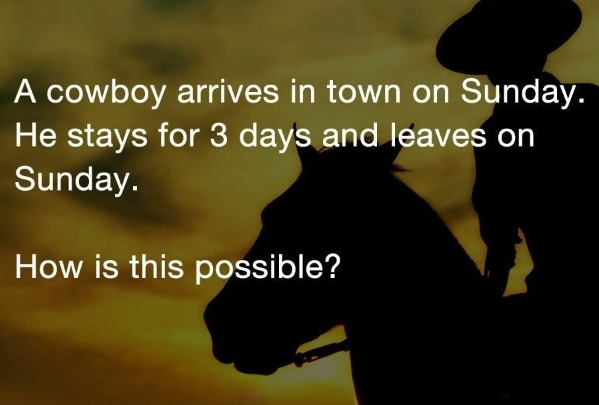Are you ready for a riddle that might make you think twice? Here’s a fun one to test your logic: A cowboy arrives in town on Sunday. He stays for 3 days and leaves on Sunday. How is this possible?
At first glance, this seems like an impossible scenario. If the cowboy arrives on Sunday and stays for three days, how can he leave on Sunday? It’s the kind of puzzle that gets you scratching your head, but there’s a clever solution behind it. Let’s dive into the logic and break down the riddle step by step.

Breaking Down the Timeline
The key to solving this riddle lies in how we interpret the word Sunday. When most people first hear this riddle, they automatically think of Sunday as a day of the week. If the cowboy arrives on Sunday and stays for three days, he should leave on Wednesday, right? But the riddle insists that he leaves on Sunday. This is where many people get stuck.
The Main Trap: Literal Thinking
The main trap in this riddle is that we are conditioned to think of Sunday only as a day of the week. It’s such a familiar concept that we don’t stop to think that the word might have another meaning. This riddle relies on our automatic assumption that Sunday is just a day of the week, but that’s exactly where we go wrong.
Thinking Beyond the Obvious
To solve the riddle, we need to think beyond the obvious. What if Sunday isn’t the day of the week, but something else entirely? That’s right, the trick here is that Sunday is the name of the cowboy’s horse! So, the cowboy arrives in town on his horse named Sunday, stays for three days, and then leaves town riding the same horse, Sunday.
The Clever Solution
So, here’s how it works:
- The cowboy arrives in town on his horse named Sunday.
- He stays for three days.
- Then, he leaves town on the same horse, Sunday.
The riddle plays on the double meaning of the word “Sunday.” Instead of focusing on the day, the riddle is talking about a horse, which makes the timeline perfectly possible.
Why This Riddle Trips People Up
Riddles like this one can easily trip people up because they rely on small details that change everything. In this case, the riddle plays on the assumption that Sunday is only a day of the week. When we hear the word Sunday, our brains immediately jump to thinking about the calendar, which makes the situation seem impossible. But the riddle challenges us to step back and consider other possibilities.
A Lesson in Creative Thinking
This riddle teaches us an important lesson in creative thinking: sometimes, the answer is right in front of us, but we need to shift our perspective to see it. In this case, the solution was hidden in plain sight. By thinking of Sunday as something other than a day, the puzzle becomes easy to solve.
How Did You Do?
Now that you know the answer, how did you do? Did you figure it out, or did the name Sunday throw you off? If you were thinking along the lines of days of the week, don’t worry—you’re not alone! That’s exactly how this riddle is designed to trip people up. But now that you see the trick, it’s a fun example of how riddles can challenge us to think differently.
Conclusion: Keep Your Brain Sharp with Riddles
Riddles like this one are a great way to keep your brain sharp and engaged. They challenge you to look at problems from different angles and think creatively to find the solution. Whether you solved the cowboy riddle right away or got stumped at first, it’s all part of the fun of problem-solving.
Next time you come across a tricky question or brain teaser, remember the cowboy and his horse Sunday—and keep thinking outside the box!